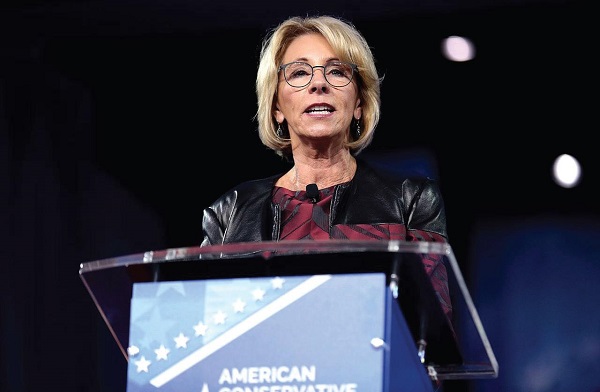
By Yaasmeen Piper
A&E Editor
Title IX changes could be in store under the Betsy DeVos administration. The Secretary of Education addressed her concerns at George Mason University’s campus in Arlington, Virginia this June.
In her prepared remarks released by the U.S. Department of Education, DeVos stated that the current policy enacted under the Obama administration did not create an equal balance between the victims and those who were accused.
“There is no way to avoid the devastating reality of campus sexual misconduct: lives have been lost. Lives of victims and the lives of the accused,” DeVos said.
ESU’s Title IX Correspondent and President of Student Affairs Doreen Tobin said DeVos was attempting to illustrate fairness.
“The underline concern comes from people who feel that the Title IX policy predisposed universities to view claiming victims of sexual assault as 100 percent true,” Tobin said, “that there was not the kind of rigorous investigation and support for the other student that is being accused.”
However, Tobin said since starting as a Title IX Coordinator in 2011, every student has seemed sincere about their report.
“I have not met a student yet that came here with a complaint who did not fully believe that what they were sharing with me was a legitimate assault. However, there has been instances where after the case has gone to a hearing the respondent has been found not responsible,” said Tobin.
Ariel Tucci, president of the Feminist Alliance Club and psychology and English major agrees there could be minor adjustments to the policy but accuses Devos of attempting to turn the accused into victims.
“I don’t believe she has the qualifications or the mindset to care for the survivors while talking the slight possibility that the accused have been under false pretenses,” said Tucci.
In April 2011, the Obama administration released their “Dear Colleague Letter” which added new Title IX guidelines for schools and universities.
The memo called the statistics on campus assault “deeply troubling and a call to action for the nation” and encouraged schools to increase their force on ending sexual assault.
DeVos said the memo was a “burden” to schools and the guidelines were so confusing even lawyers did not understand some of them.
“The failed system imposed policy by political letter, without even the most basic safeguards to test new ideas with those who know this issue all too well,” DeVos said. “Rather than inviting everyone to the table, the Department insisted it knew better than those who walk side-by-side with students every day. That will no longer be the case.”
While DeVos’ plan to infiltrate this policy was vague, she did reiterate that sexual assault or misconduct was in no way acceptable.
“We know this much to be true: one rape is too many. One Assault is too many. One aggressive act of harassment is too many,” she said.
Title IX is a policy enacted to defend against sex based discrimination which includes assault, rape, and other acts of sexual misconduct.
“As a Title IX Coordinator for the university, I have to be aware of all the reports that are made and to look not only from the individual level of the student as best served but also from a university perspective,” Tobin said, “to look and see if there are patterns, themes or things that we need to address in the environment to prevent future assaults.”
According to the National Sexual Violence Resource Center, one in five women are victims of sexual assault and one in 71 men. In 2015, ESU had five reports of forcible sexual offenses.
Most Title IX violations fall under the sexual misconduct category such as verbal and nonverbal harassment, cyber bullying, and stalking. In the same year, there were 13 incidents of stalking, five accounts of dating violence and one report of domestic violence.
Even those numbers could be larger in actuality. Tobin classifies rape and other forms of sexual misconduct as “one of the most under reported crimes on campus and otherwise.”
“I would say at least 75 percent of the victims do not know what they want to do at some point,” said Chief of Police William Parrish. “Everyone thinks that if you’re assaulted that accused is going to jail. The victim has to make their own determination on how they’re going to deal with it.”
Parrish points out that some survivors do not want to be put in a public arena and have to relive the event.
“I can’t blame them,” he said. “As a police officer, all I want to do is put the bad guy in jail, but I can’t blame them.”
Tobin says she has gotten an increase in the number of people reporting or encouraging their friends to report and this should not be looked at as directly negative.
“What we’ve had is a greater sensitivity on campus across the board in terms of what is appropriate conduct when it relates to sexual activity,” Tobin said. “There are people who are walking their friends down to the office or to the police station and saying ‘I really think you need to tell your story.’”
There is no certainty that ESU and other campus’ throughout the nation will see changes to Title IX anytime soon.
“Again, everybody needs to have things reviewed, looked at and all that, and certainly there may be people out there that did not have their day in court,” Tobin said.
“But, we can’t turn back and say now it’s okay for women to be raped. I think people would rise up about something like that, if we were to turn things back to the way they were 20 years ago.”
Email Yaasmeen at:
ypiper@live.esu.edu

